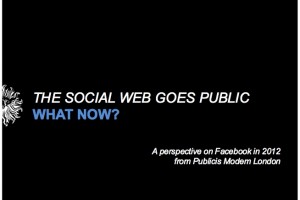Here is one of the best content that I’ve seen lately about Facebook, and the fact that the social network is going public. It comes from Publicis Modem London, it is published on SlideShare, and I really recommend that you spend some time browsing through it’s content.
If I summarize: More than 85% of it’s revenue comes from advertising. Facebook is soon going public with a valuation of roughly $100bn. At first sight, you can think that this number is absolutely huge, and that it could hardly make multiples, which is basically the reason why investors would invest.
But then you realize that facebook in 2010 grabbed only a small 3% of the total digital market, when Google earned a comfortable 46%. The ARPU of a Google user is 8 times more than the ARPU for a Facebook user, so there’s room for a progression.
How can facebook increase it’s revenue? Either by adding more users, or by selling more ads, or by selling more performant and more expensive ads.
In some geographies, the Facebook penetration is approaching saturation. The growth in terms of users is slowing down, but the time spent and the stickyness is still growing, as you can see by checking the ratio of facebook DAU over MAU that keeps growing.
So, the other option is to push more ads to the users – we have seen lately a new picture viewer which now can display ads in the right column – and also to make better and more expensive ads, by better target profiling. This is where the new “Open Graph v2” APIs comes to play, and will allow a never seen before highly accurate and fine user profiling by logging each and every of your so-called “frictionless activities”. What you read, what you listen to, the videos you’re watching, and so on and so forth, all your actions “online” – and not only while in Facebook, and now only in your browser, just think of your Spotify player on your iPhone… – will sculpt a very realistic portrait of you as a consumer.
This is a brilliant strategy to build a much better and finer ads system than the current Google AdWords leader. No doubt that the gap between the 3% and 46% of the digital pie between Facebook and Google from 2010 will soon become a figure of the past.
To be continued… :)
Oh, and make sure you don’t miss their 9 points in the “What If” section, starting at slide #52.
Ever though of the potential of these 9 ideas that Facebook could eventually implement someday? Can you feel that power?

Great presentation.
The first three “What if” are more than likely ;)
For me the biggest “What if” is “What if Facebook broadcasted tv programs ?”, I do see a fight between Youtube and Facebook on the future of tv ;)
Sure François!
We have seen facebook doing some “real life” experiments by broadcasting events, show and concerts directly inside the social platform… We can assume that the technical part is ready. It now must be a question of contents, distribution rights, monetization, legal agreements, etc…